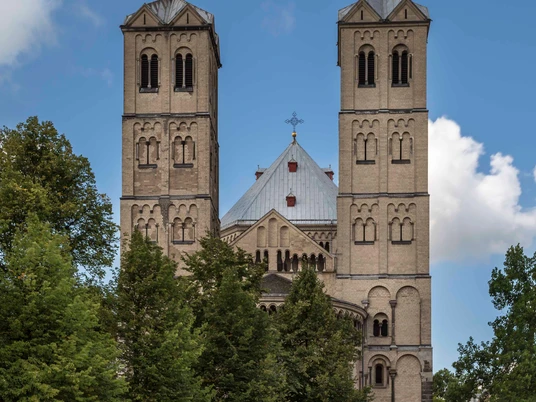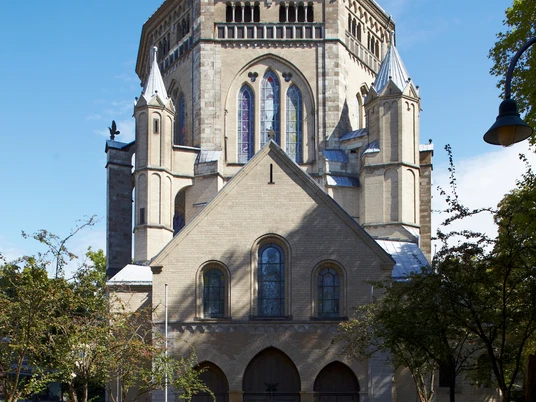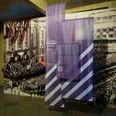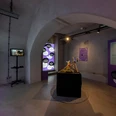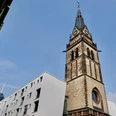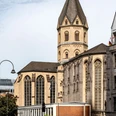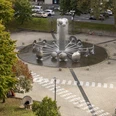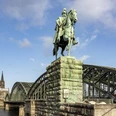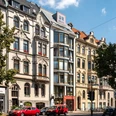St. Gereon is among the oldest churches in Germany, one of the unique 12 Romanesque churches in Cologne, and is famed for its decagonal dome—the largest dome construction north of the Alps. Its history stretches back to the 4th century AD when a monumental oval structure was built over a Roman burial site. Besides the mosaic floor fragment, the masonry walls and the "Blood Column," a granite pillar believed by legend to differentiate between good and evil, still stand. Do you dare to stop by it?
Decagon: Unique ten-sided structure with a dome and apses
Having passed through the vestibule, you find yourself inside the ten-sided oval dome structure: four walkable stories high, with a dome spanning 21 meters and a peak height of 34.5 meters, built between 1219 and 1227, featuring eight apse-shaped niches—four to the south, four to the north. Stand in the center and look up to fully appreciate the grandeur of this hall: from the gallery zone above the apses to the tiered sequence of lancet windows and the illuminating zone.The Second World War inflicted significant damage on the decagon, and repairs took until 1985, around 40 years. The windows were created from 1979 to 1986, following designs by Georg Meistermann and Wilhelm Buschulte.
Predecessor and "foundation": Late antique central building on a Roman burial site
Over the centuries, St. Gereon has undergone several transformations. The decagon, for instance, arose from encasing a late antique central structure into a ten-sided form. Approximately 16.5 meters of the original oval foundation remain, easily visible on the north side of the decagon. Back then, the apses were windowed, already hosting a dome—with a diameter of 23.7 meters by 19.8 meters. In one of these apses, you can still view the only preserved part of the mosaic floor, once adorning the entire central building.The function of that late antique central building from around 350 AD remains uncertain. It was likely a mausoleum or church built on a Roman burial site, suggested by Cologne's oldest Roman cemetery located there.
In the 11th century, Archbishop Anno II of Cologne redeveloped the basilica, adding a choir and crypt. About a century later, an apse was added, and by the 13th and 14th centuries came the decagon, a baptistery, and a sacristy. The upper sacristy, a highlight of Gothic architecture, was finally restored in 2019. Join one of the regular tours through St. Gereon to learn many more details.
St. Gereon: Basilica and Patron Saint of Cologne
As the name implies, St. Gereon is dedicated to the martyr saint Gereon. Legend recalls that Gereon, a Roman officer of the Theban Legion, along with his followers, defied the imperial order to persecute Christians and was executed, beheaded in about 304 AD as a penalty. His blood and that of his comrades spattered a column found at the decagon's entrance—left as you enter—the renowned Blood Column.In the crypt stands the sarcophagus with Gereon's remains; across the basilica's green space, there's also a sculpture of Gereon's head. You might encounter Gereon elsewhere in Cologne, revered as the city's patron saint.
The Blood Column
St. Gereon’s Blood Column is said to possess decisive powers: Allegedly, it can distinguish between good and evil, having once been drenched with the blood of Gereon and his men on its granite surface. This was the downfall—so legend tells—of Merovingian King Theoderic, who had killed his brother and nephew in battle, came to celebrate at the church, and collapsed before the column dead.Despite all warnings, which also caution today's visitors with its inscription: "Adde fidem, fuit hic pridem fusus cruor idem ad lapidem, si dem me male, punit idem," freely translated as: "Believe it: Purely upon this stone, the blood once flowed. If I am guilty, punishment awaits."
The furnishings and further rooms of St. Gereon
Aside from the main decagon and upper sacristy rooms, St. Gereon also offers smaller, mysterious spaces to explore, such as the 13th-century baptistery with well-preserved zigzag pattern frescoes, a late Romanesque baptismal font, and a triptych circa 1515. The baptistery door is located in the apse to your right as you enter the basilica.In contrast, the door to the noteworthy crypt is to your left, featuring 12th-century floor mosaics depicting Old Testament scenes, a tuff stone altar from around 1530, and Romanesque ceiling paintings. The crypt also houses the sarcophagus with Gereon's bones.
The Crescent Madonna and Blasius Altar from 1319, preserved frescoes in the apse, a life-sized alabaster crucifix from the mid-17th century, the valuable double doors to the sacristy depicting Ecce homo and Mater Dolorosa from the early 16th century are exemplary of St. Gereon's carefully guarded treasures.
Pietà Chapel—a space for reflection, to conclude
Before departing, dedicate some time in the neo-Romanesque chapel from 1897 located in the vestibule—if you haven't already done so at the start of your visit. From one of the benches, enjoy a splendid view of the Pietà, sculpted by Anton Josef Reiss after Michelangelo's model: Time for inner contemplation, thoughts, and tranquility after so many impressions under a dark blue vaulted ceiling resembling a starry sky.Good to know
Openings
Payment methods
Directions & Parking facilities
Nearby
